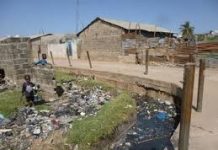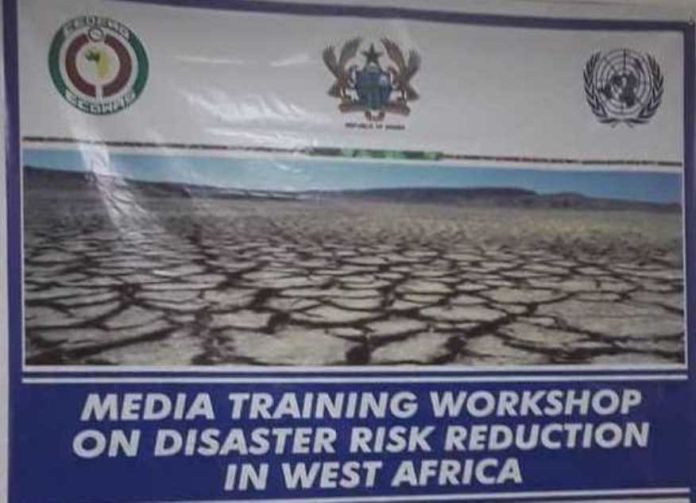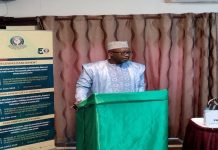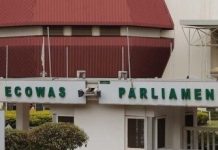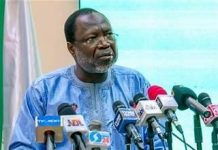By Fatoumatta K Jallow Accra, Ghana
A-two-day ECOWAS Regional media training on Disaster Risk Reduction and Management organised by the ECOWAS Commission for 25 participants from English speaking member countries, concluded in Accra, Ghana on Wednesday.
The objective of the training workshop was to further train media originations about Disaster Risk Reduction (DDR) and Management issues and how to report appropriately on hazards and their impact in social development; how to play key roles in creating awareness and disseminating information about Disaster Risk and Vulnerability of the people and livelihoods; to use media to raise community and national awareness about disasters, promote the use of knowledge and build the culture of safety and resilience in the region; and to enhance various advanced communication means for giving early warning, evacuation plans and help post-disaster activities.
Speaking at the opening ceremony, Mohammed Ibrahim Head of ECOWAS Humanitarian and DRR Division said Africa is acknowledged to be the most vulnerable continent to natural hazards and to climate change with negative impacts on the economic and social development of the entire continent.
“In West Africa, the extent of vulnerability and risk exposure and losses from disasters are expected to continue to increase over the next decades”, he added, saying: “Floods and drought remain the most serious disasters in West Africa.
He pointed out that the frequency, intensity and severity of floods have increased significantly in the sub-region, leading to increased mortality rates, erosion of social capital and livelihoods and considerable damage to infrastructure (including educational infrastructures) in the Member States.
The West African region, he went on, has also been categorized as having one of the fastest growing populations and the most rapid rate of urbanization in Africa which exposes the region to more risks and disasters due to lack of coping capabilities to the fast pace of development, and planning needs.
In response to the growing risks of disasters, Mr Ibrahim said the ECOWAS Commission, in collaboration with its partners, has developed a new plan of action for the period 2015-2030 in accordance with the Sendai Framework for Disaster Risk Reduction (DRR), the AU Regional Program for DRR and the ECOWAS DRR Policy to implement activities to build the capacity of Member States.
To concretise its efforts in the above direction, the ECOWAS Commission has been providing capacity building in terms of training to Member States citizens to empower them with skills relevant to disaster risk reduction, crisis management and response, he also said.
He noted that a lot of efforts are being made by various stakeholders including governments, non-governmental organisations, regional organisations as well as the United Nations to address global disaster risks reduction concerns.
He highlighted that response to disasters alone is not sufficient to meet the increasing demand caused by hazards impacts on large populations and therefore it is important to share knowledge that can help with identifying hazards and risks, taking action to build safety and resilience, and reducing future hazards impacts.
Communities and individuals can become partners in this, he revealed, saying: “public awareness and public education for disaster risk reduction can empower normal people everywhere to participate in reducing future suffering”.
“As the fourth power, the media has a vital role to play in disaster risk reduction efforts”, he remarked, noting that “journalists must ensure information provided alerts the affected public, helps communities prepare for a disaster and focuses on how and where to seek help in the event of a disaster”.
According to him newspapers, radios, televisions and other media institutions have an important role to play in raising awareness and disclosing information about these disasters.
“The coverage of the various disasters that occur each year arouses attention, sometimes even the alarm, of the public at national, regional and international level”, Mr Ibrahim said further.
“Journalists can do better than inform and educate the public about disasters; they can shake up mentalities and behaviours; especially today with the threats of climate change”, he stated.
He saluted the efforts of the Government of Ghana and UN systems especially the United Nations Office of Disaster Reduction (UNDDR) for supporting the event.
In conclusion, he reaffirmed ECOWAS’ commitment to continue to work with Member States and other regional and international partners to promote the actualisation of the four priority areas of the Sendai Global Framework on Disaster Risk Reduction.
Madam Charlotte Norman, Director of Disaster Risk Reduction and Climate Change for the National Disaster Management Organisation of Ghana said media reporting plays a very critical role before, during and after disaster occur.
She added that she hopes the knowledge gained will go a long way in helping the respective countries in disaster risk reporting.
